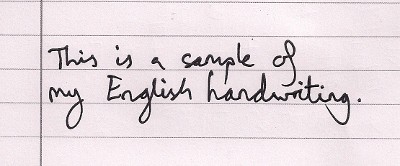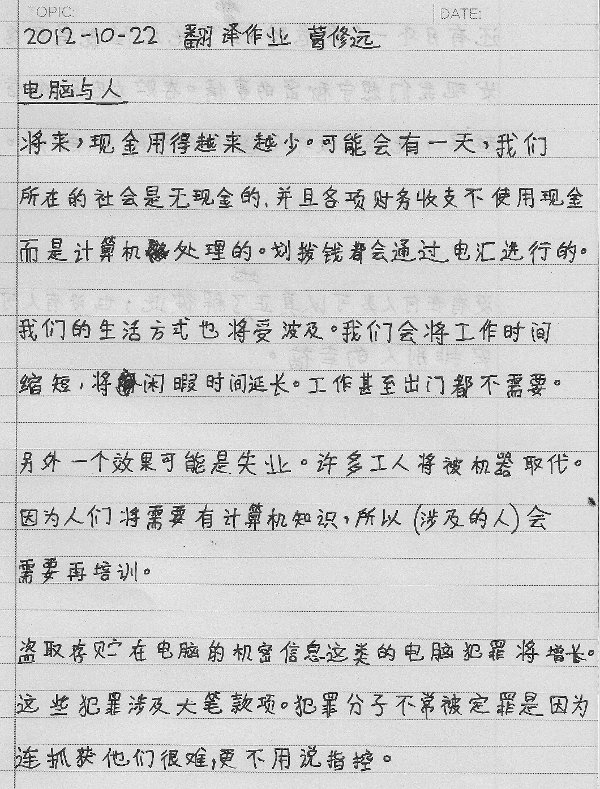A sample of my Chinese handwriting (October 2012)
After studying Chinese for three years, I still feel like my Chinese handwriting leaves a lot to be desired. I almost never handwrite (in Chinese or in English), only doing so when forced to by my course. The result is that my handwriting is still this spidery, uneven scrawl that’s very obviously written by a non-native speaker.
I’m posting part of a handwritten translation homework I did today. The translation hasn’t been checked, so there are a lot of mistakes in it. You are of course welcome to comment on those, but my focus with this post is the handwriting. Click for a large version of the scan.
[Sample of my Chinese handwriting](http://static.eastasiastudent.net/wp-content/uploads/2012/10/2012-10-22-handwriting-large.jpg)
I’d say the main problems with my Chinese handwriting are:
- Character spacing. The hanzi are generally too far apart, and the spacing is very uneven.
- Character dimensions. The hanzi don’t feat neatly into regularly sized boxes like they should do. E.g. 子 is too thin and 有 is too wide. 贮 is outrageously uneven.
- It doesn’t flow. Ideally one day I’d like to be able to at least write with some consistent movement rather than laboriously separating strokes as in the sample above.
I suppose I’d like my Chinese handwriting to be somewhat equivalent to my English writing. It’s not anything to shout about, but at least it doesn’t look like it was written by a three-year-old (I hope):

If anyone’s got any tips for how to improve my Chinese handwriting (other than handwrite more!), please share them in the comments. 請大家教一下!
If anyone’s interested, he’s a digital copy of the hand-writing sample shown above (corrections in red):
电脑与人
将来,现金会用得越来越少。可能会有一天,我们所在的社会是无现金的,并且各项财务收支不使用现金而是计算机处理的。转帐都会通过电汇进行的。
我们的生活方式也将受到影响。我们会将工作时间缩短,将闲暇时间延长。甚至工作都不需要出门。
另外一个效果可能是失业。许多工人将被机器取代。因为人们将需要有计算机知识,所以(涉及的人)需要接受再培训。
像盗取存贮在电脑的机密信息这类的电脑犯罪将增加。这些犯罪涉及大笔款项。犯罪分子不常被定罪是因为连抓获他们都很难,更遑论指控。
And the original English it was translated from:
Computers and People
In the future, cash will be used less and less. We may one day, live in a cashless society where all financial transactions are processed by computers without the use of cash. Transference of money will be through electronic transfer.
The way we live will also be affected. We shall work shorter hours and have more time for leisure. There will even be no need to go out to work.
Unemployment may also result. Many workers will be replaced by machines. People will need to be computer-literate and re-training is required for the people involved.
There will be more computer crimes like theft of confidential information stored in computers. Large sums of money are involved. The criminals are rarely convicted because it is difficult to catch, let alone charge them.

